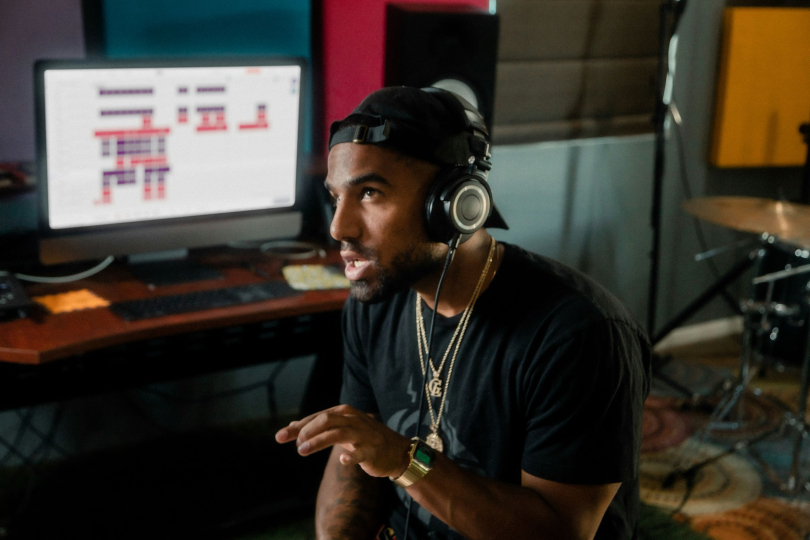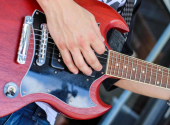
TOP 5 Practice Methods without an Instrument
Every musician longs for perfection. We want to compose the perfect song, play the perfect round of chords, the perfect bass line, the perfect drum beat or achieve the perfect production for a new album. We are driven by the desire to express our innermost selves to the fullest through the instruments we hold in our hands. Guitarists race through fast solos, bassists slap like crazy and drummers rumble complex gospel chops breaks. We spend countless hours in rehearsal rooms or our bedrooms working on our playing technique or songwriting skills. But what if you don't have that opportunity, what if you can no longer spend as much time with your beloved string and pleasantly resonant sweethearts? In that case, you can make use of these TOP 5 practice methods without an instrument in your hand.
1. Fingerboard visualisation
In a recent interview, bassist Tal Wilkenfeld shared her unique practice technique. You may know Wilkenfeld from her collaborations with jazz and rock greats such as Chick Corea, Herbie Hancock, Jeff Beck, Lee Ritenour, Prince and Mick Jagger. Since 2016, she has been pursuing a solo career where she has added singing to her bass playing and, most importantly, writing her own songs. She burst onto the scene as a phenomenal talent and her bass solo on Jeff Beck's "Cause We Ended as Lovers" (live on Crossroads 2007) is, in my opinion, one of the shining gems of the bass world.
However, her path to virtuosity was a very strange one, as her parents had imagined an academic career for their talented daughter and allowed poor Wilkenfeld to practice for only 30 minutes a day (she started playing guitar and later switched to bass). With this rather brutal time constraint, Wilkenfeld invented her own method of practising by visualising a fingerboard on which she could imagine herself playing her favourite licks or songs at any time of the day. Not even your parents can see into your head, and thus she was able to go well over her daily practice limit.
A beautiful story with practical guidance for all latent musical geniuses who don't have time to practice but want to reach their virtuosity potential. Learn not only to name all the notes on the fingerboard but also to visualise fingerings for playing scales, exercises or songs.
2. Active listening
Of course, we all love listening to music, but have you ever tried focused active listening? Active listening involves taking a recording of the song you're working on and listening to it (you can try it with notes or tabs in front of you) without any distractions. By letting your brain fully focus on the music, instead of absentmindedly scrolling through social media content or ruminating on the duties and worries of everyday reality, you're allowing your brain to make unique connections.
When you focus on the physical aspect of practising while playing an instrument, you often don't really notice what you're playing and how it sounds in the context of the piece. Active listening is your chance to hear how your part fits into the context of the composition and perceive the smallest details such as the interpretation of different playing techniques, the tone colour, the arrangement of the part or the use of effects.
By the way, apply the active listening method to recordings of your performance – whether from the studio or even the rehearsal room. My first experience in the studio, where I heard my isolated bass part with all its mistakes through high-end studio monitors, was probably the strongest motivation to work much harder and more thoroughly on my playing technique and expression.
3. Singing, clapping, whistling or rapping
You may have heard someone in the music business say, "If you can sing it, you can play it." And this statement definitely applies! If you're struggling with a complex rhythm, interval, or melodic idea and can't learn it by ear or locate it on the fretboard, singing or clapping out the rhythm can help your brain understand the difficult phrase before you try it out on the instrument. Take a deep breath, put down your instrument, engage in active listening and try to hum, whistle, sing or clap along.
Above all, don't feel ashamed of yourself! It doesn't matter if you sing in tune or if you have a beautiful voice, it's about connecting with the music and finding your way to it. You'll find that over time you'll be able to reproduce very complex musical phrases just with your mouth and the time it takes you to pick up songs will dramatically decrease.
4. Scheduling the practice
Preparing for effective and beneficial hours spent with the instrument is just as important as the actual practice! Practising without a plan is like throwing a bunch of random ingredients into a bowl and expecting a cake to miraculously bake. Never practise (or bake cakes) without a plan! Every week, spend 10 to 15 minutes planning the practice for each day of the upcoming week. Think about how many minutes you will dedicate to warm-ups, technical exercises or etudes, listening to songs, learning new techniques, and so on. Then set a time limit for each activity and try not to exceed the scheduled timeframe.
It may seem slightly pedantic, but a tightly structured and well-thought-out practice session will ultimately save you a lot of otherwise wasted time spent mindlessly roaming the fretboard or watching "guaranteed" tips and tricks from YouTube.
5. Rest
Rest is just as important for your body and brain during intense hours of practising on your instrument or singing as time spent in the rehearsal room. We need to switch off not only to avoid physical injury from over-playing but also to hit the much-needed "off" button to have a chance to learn and remember what we just practised!
Scientific research has confirmed that cognitive function is greatly reduced when the body and mind do not get enough rest and sleep. Attention span, reaction time and overall mental and emotional health are negatively affected when we don't rest. Musicians, like athletes, are disciplined and spend long hours practising their instruments. Unlike musicians, however, athletes have coaches who schedule regular rest days to allow the body to recover from strenuous activity – and it is during these rest days that athletes have time to absorb the benefits of their previous hard work.
So, musicians too need plenty of time to rest and to refresh their bodies and minds. Only then they can store all the amazing riffs and licks they've worked on so hard in their brains and have the drive and enthusiasm for another round of inspiring practice.
If you have found an error or typo in the article, please let us know by e-mail info@insounder.org.





